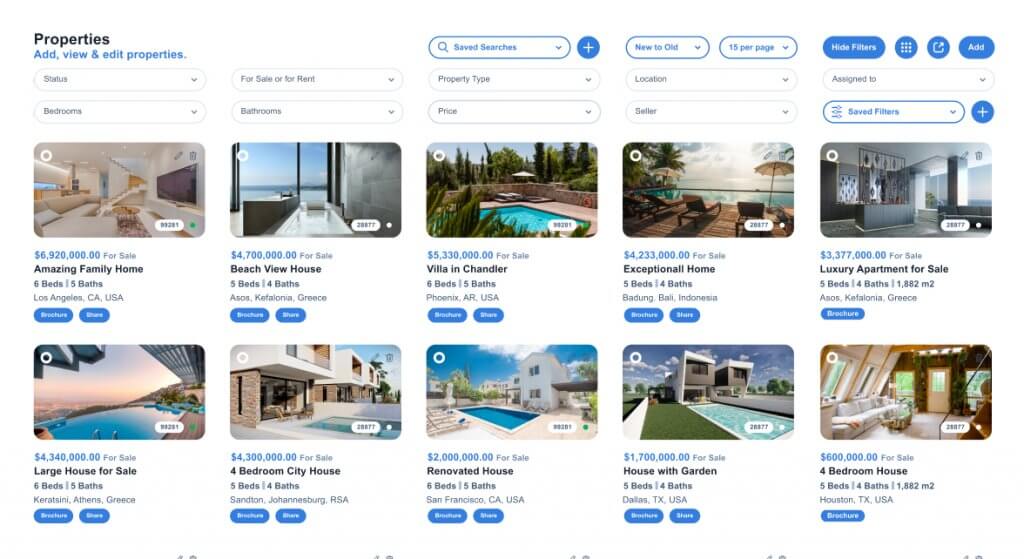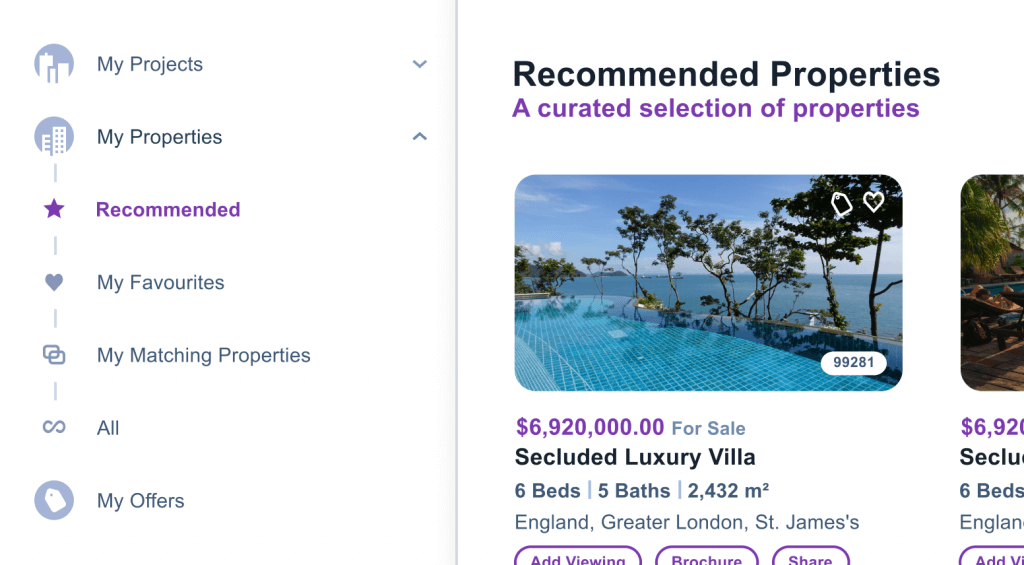In the old days, realtors would make phone calls, send faxes and manually write in calendars. Meeting a client would involve an old school paper map to find the location. Nowadays, you would field calls, answer emails, post properties on social media and rush off to show homes, with a pinned location. As a realtor in today’s world, you’re definitely juggling plenty of balls. To keep those balls from falling, you need a powerful real estate CRM. Before you make an investment, this blog aims to shed light on the 7 top features to consider when buying a real estate CRM.
Table of Contents
- What is CRM
- What is real estate CRM and what does this software do?
- Capture leads and match properties to them
- Seamless database upload
- Keep track of all your activities
- Manage your sales team effectively
- Easy-to-read dashboard
- Marketing automation tools
- Reports to make informed sales decisions
- Conclusion
There are plenty of CRM’s available in the market today. Choosing one that fits your unique needs can be overwhelming . However, before you buy, there are important features to consider. If you shudder at the idea of the high maintenance cost associated with having a CRM server in-house to store all your company data, you can opt for a CRM that has been specifically built for the real estate industry.
”The best real estate CRM should be built specifically for the real estate industry and help you streamline your prospect and customer communications. It should have easy-to-use communication as well as contact and lead pipeline management tools. Make sure that the CRM you pick is made for the real estate industry and matches your specific use case.” Forbes Advisor
Before we delve into the features that make a perfect CRM, it’s important to look at your organization and ask the following:
- Examine your agencies needs: Take a moment to closely examine your team’s needs so you can shop for specific features and tools. What are the features that they lack and what tools are important moving forward?
- Shop for integration: If you’re not choosing an end-to-end CRM platform, you’ll need to make sure that you can merge with your existing systems.
- Talk to your agents: Your agents will be using the CRM every day so ask them for their insights. After all, they will be implementing it and your team truly knows the issues they face on a daily basis. Plus, inclusion fosters trust and enthusiasm. By including your team in the decision making process, they are more likely be on board once implementation takes place.
- Ask about training: Your team will need to understand the tech in order to use the system effectively. All professional providers should offer training instructions along with ongoing support.
- Request a free demo: Before making the commitment, insist that a free demo is included. This way, you will feel confident when you make the commitment. Always remember to try before you buy!
- Is the system worth the price?: CRM services can be expensive when purchased by individual agents or small teams. However, if they’re used correctly and if they are designed well, they are still worth the investment. Understanding the key features of a real estate CRM will help you make an informed decision.
Are you ready to purchase a top class CRM software for your agency? Before you commit, keep reading to discover 7 important features to keep in mind when buying a real estate CRM.
What is CRM?
CRM stands for customer relationship management. Designed to allow you to seamlessly manage your real estate business from a single platform, regardless of whether you are at your office or on the go. It does this by storing data in the cloud. Whether you use it to capture leads, automate your marketing or manage your property listings, ultimately, it’s a process that combines software and strategy to convert leads into clients.
What is real estate CRM and what does this software do?
Any industry that has a client database, relies on communication and hopes to convert leads into sales, needs a CRM system. The real estate industry is no exception. Realtors need to manage their time while improving the personalization of their communications. Customer relationship management (CRM) software does exactly that. It lets you manage every interaction and aspect of your client relationships. Having a powerful CRM system that streamlines this process is critical to your success.
There are plenty of CRM’s available in the market today. Choosing one that fits your unique needs can be overwhelming . However, before you buy, there are important features to consider. If you shudder at the idea of the high maintenance cost associated with having a CRM server in-house to store all your company data, you can opt for a CRM that has been specifically built for the real estate industry.
What to keep in mind when buying a real estate CRM
1.Capture leads and match properties to them
Your prospective clients can come from anywhere. It can be through the website, LinkedIn page or a web form. With so many sources, it’s difficult to keep track. Keeping track of leads and matching properties to them is a key factor when purchasing a CRM. Having the ability to automate the following processes will help you move those leads through your sales pipeline more efficiently.
- automatically capture the clients’ information no matter where it comes from,
- track your client’s activities on your website and share valuable insights which gives your agents the much-needed context for their initial correspondence,
- track your client’s activities on your website and share valuable insights which gives your agents the much-needed context for their initial correspondence,
- quickly match leads to properties,
- convert your hot leads into opportunities,
- schedule those all-important viewings.
2. Seamless database upload
What’s the point of a real estate CRM if you can’t easily import your contacts? Contacts play a key role in lead management as they relate to leads that you are engaging with and trying to sell to. Seamless database uploads are another important feature to have in mind before buying a CRM. A good CRM will play an integral role in helping you manage contact information efficiently by making the process of adding and managing contacts quick and easy. Choose a CRM that allows you to easily import your contacts with a few clicks of the mouse while minimizing duplicate data. Look for systems that work with your current contact list like Comma-Separate Value (CSV) files, Google contacts or Outlook directories.
3. Keep track of all your activities
Your CRM is a vital tool in monitoring all sales activities related to a lead, as well as the outcome of those activities. A powerful CRM will track the following activities associated with a client over the sales lifecycle:
- View email correspondence,
- add tasks and calls,
- schedule viewings and document their outcome,
- exchange comments with colleagues,
- send SMS messages or emails to clients directly from the system
Viewing all activities in a simple interface will allow you to immediately understand the status of a potential client. A CRM that allows you to view all pending tasks and deadlines related to a lead is ideal. The ability to add comments will allow you to track all notes made on a lead, as well as follow-up. Monitoring call logs will ensure all queries are being dealt with.
4. Manage your sales team effectively
You need a CRM that gives you the ability to view what your sales team is doing at any given time so you can see and act on issues immediately. When looking to purchase a real estate CRM, this information will help you identify whether more resources need to be allocated to improve service delivery. A real estate CRM system should provide you with this data. Combined with a unified view of your leads, your salespeople will have the ability to optimize their time and prioritize tasks to make sure leads are not ignored and forgotten.
5. Easy-to-read dashboard
A CRM should have an easy-to-read dashboard that will keep track of your goals, tasks and appointments. A realtor CRM dashboard is typically the first screen you see when logging in — it should help you stay on track while giving you a holistic view of where you should be focusing your business. Simple graphics that tell a story, checklists to remind you of what to do and reminders of your success are all components of a great dashboard in a CRM for real estate professionals. Real Estate CRM dashboards are integral components of the software, providing essential business intelligence. If used properly, CRM dashboards offer users a visual representation of all key business metrics through the collation of real-time data from a variety of sources. Make sure that an easy-to-read dashboard is a key factor when purchasing a CRM.
6. Marketing automation tools
Marketing automation is a set of tools designed to streamline and simplify some of the most time-consuming responsibilities of the modern marketing role. From automating the lead qualification process to creating a hub for digital campaign creation, automation is all about simplifying a business world that is growing at an increasingly rapid speed. New generation marketing automation tools provide valuable insights into the customers’ preferences and into the success level of each marketing campaign. Marketing automation lets you implement a digital marketing strategy without having to manually press “send” on each and every email, campaign, or post you create. Good automation tools help you identify your audience and design the right content. It automatically triggers actions based on schedules and customer behavior. An automated marketing strategy can save time and resources, driving revenue and ROI while you focus on growing your business.
If you are a realtor looking to optimize your marketing, look to CRM software that offers the necessary marketing automation tools before you decide to buy.
7. Reports to make informed sales decisions
Reports are a great way to keep your business informed, honest and objective. If there’s something wrong with the progress of things in general or an issue specific enough for detailed analysis, then detailed reports will help you find out what it is. Reporting offers increased visibility on how your real estate business is doing and can assist with:
- Generating customizable reports to track lead conversions,
- projecting future revenues,
- measuring performance of sales and marketing campaigns,
- monitoring how leads are progressing through your pipeline.
With an old fashioned spreadsheet, you have to organize your data by yourself because no program is built specifically for sales and real estate. Real estate CRM not only saves time in fetching these reports but also helps in creating a variety of reports that might be too complicated with spreadsheets. Data can help you answer customer-centric questions, and CRM systems can assist you in doing so. When you buy a CRM, you won’t ever have to memorize any formulae or cell numbers again. Just select your report type and let your CRM churn out data for analysis.
Conclusion
”If your agency still doesn’t have a CRM, you’re only hurting your business. It will save you hundreds of hours and thousands of dollars each year. And almost all CRMs allow you to take even more of the work off your plate with automation capabilities.” Zapier.com
CRM systems designed specifically for the real estate industry come with plenty of features.
- Effective lead capturing and tracking,
- seamless database uploads,
- tracking activities and team members,
- easy-to-read dashboard,
- marketing automation tools,
- report generation.
With these functions, your CRM real estate software should manage your real estate business effortlessly. If you’re not harnessing the power of CRM for your real estate agency, you’re definitely missing out on sales. Without a system in place, you may as well travel back in time to when files were stored in cabinets, contacts were scribbled on post-its and newsletters were sent via fax. We are living in the digital era, it’s time to use technology to work smarter, not harder!
To learn more about Qobrix and the tools it provides real estate professionals to convert leads more effectively and increase property sales, schedule a FREE demo with our sales team here.




